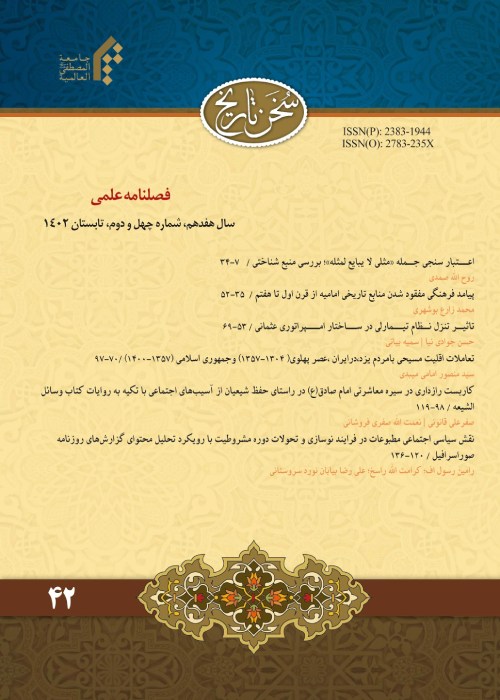The power struggle after Harun al-Rashid in the Abbasid caliphate Emphasizing the theory of Laclau and Mouffe
Author(s):
Article Type:
Research/Original Article (دارای رتبه معتبر)
Abstract:
Governments and political rulers have always had plans to gain power. Harun al-Rashid divided the areas of the caliphate among his children, and after him, gaining power and the caliphate became the reason of conflict between the successors. In the meantime, Mamun played an important role in consolidating the Abbasid caliphate and his taking office by adopting political plans and actions in gaining power and caliphate. This article, documenting sources and based on Laclau and Mouffe's discourse theory, by tracing the roots of the power struggle between Amin and Mamun, studies and evaluates Mamun's actions to achieve power and caliphate. According to this theory, there is a forced effort and struggle between suppressed power and deprivation to create conditions in the establishment of dominance and hegemony. Dominant exercising in the form of exercising power as a political plan always try to impose their will on others. It seems that Mamun used every method and action on the way to gain power and reach the caliphate, and he set his main goal to gain power.
Keywords:
Language:
Persian
Published:
Biquarterly Journal Sokhanetarikh, Volume:16 Issue: 38, 2022
Pages:
137 to 161
magiran.com/p2499027
دانلود و مطالعه متن این مقاله با یکی از روشهای زیر امکان پذیر است:
اشتراک شخصی
با عضویت و پرداخت آنلاین حق اشتراک یکساله به مبلغ 1,390,000ريال میتوانید 70 عنوان مطلب دانلود کنید!
اشتراک سازمانی
به کتابخانه دانشگاه یا محل کار خود پیشنهاد کنید تا اشتراک سازمانی این پایگاه را برای دسترسی نامحدود همه کاربران به متن مطالب تهیه نمایند!
توجه!
- حق عضویت دریافتی صرف حمایت از نشریات عضو و نگهداری، تکمیل و توسعه مگیران میشود.
- پرداخت حق اشتراک و دانلود مقالات اجازه بازنشر آن در سایر رسانههای چاپی و دیجیتال را به کاربر نمیدهد.
In order to view content subscription is required
Personal subscription
Subscribe magiran.com for 70 € euros via PayPal and download 70 articles during a year.
Organization subscription
Please contact us to subscribe your university or library for unlimited access!


